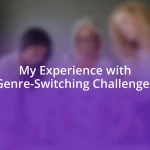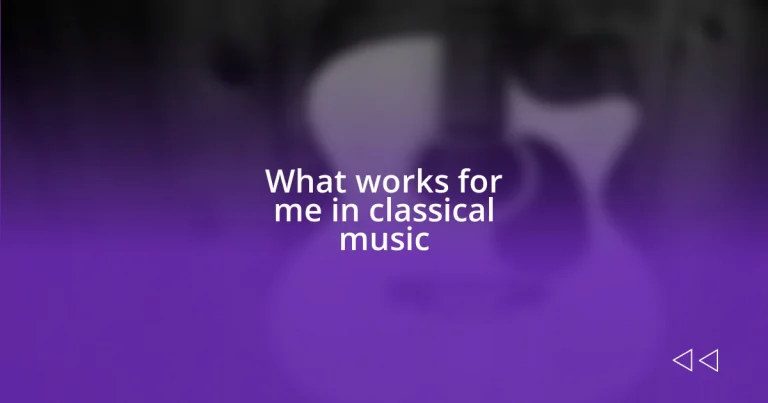Key takeaways:
- Classical music is a profound art form that evokes deep emotions and connects listeners through storytelling and personal experiences.
- Listening to classical music enhances mental well-being, cognitive functioning, and fosters a sense of community during live performances.
- Creating a personal listening routine and attending live concerts enrich the classical music experience, revealing emotional connections and communal bonds.
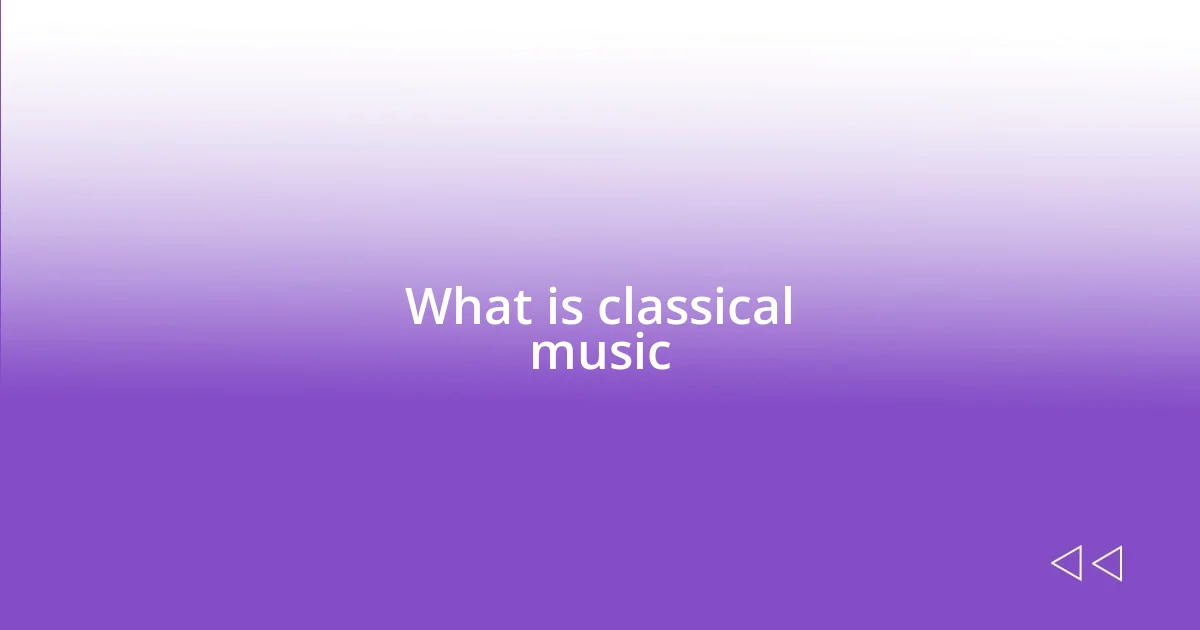
What is classical music
Classical music, at its essence, is a genre that has shaped the very foundations of Western musical tradition. It spans several historical periods, from the intricate compositions of the Baroque era to the emotional depth of Romantic works. I often find myself reflecting on those moments when I first discovered the grandeur of Beethoven’s symphonies; it’s as if the music spoke to parts of my soul I never knew existed.
What strikes me most about classical music is its ability to evoke powerful emotions and transport listeners through time and space. Have you ever been completely engulfed in a piece, feeling both joy and sorrow simultaneously? I remember the first time I heard Tchaikovsky’s “Swan Lake”—it wrapped around me like a warm blanket while reminding me of life’s fleeting beauty.
Moreover, classical music is not just about the notes; it’s about the storytelling woven into every score. Each composer has a unique voice and narrative that unfolds, allowing listeners to connect on a deeply personal level. There’s a magic in discovering how Mozart can bring a lightness to your spirit or how Chopin’s nocturnes can echo your innermost thoughts. What do you feel when you listen? For me, it’s a reminder of the profound experiences we share through this timeless art.
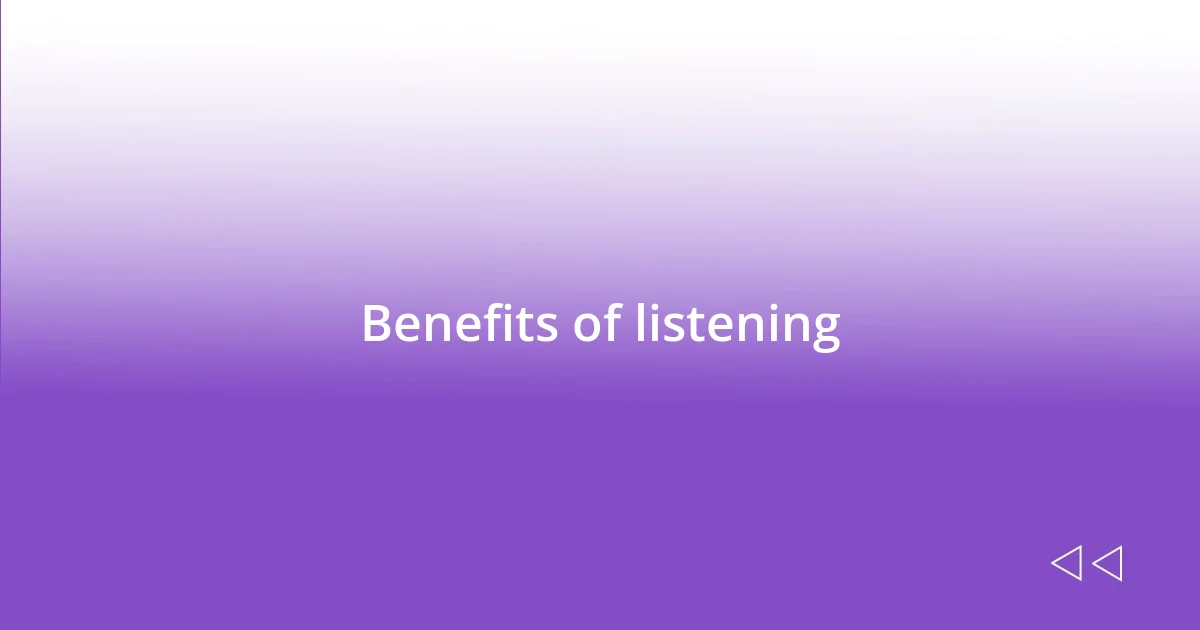
Benefits of listening
Listening to classical music offers an array of benefits that can greatly enrich our lives. One of the most notable advantages is its impact on mental well-being. I remember studying for finals while Bach’s cello suites played in the background; the soothing melodies helped me maintain focus and reduce stress. It’s fascinating how the right composition can create a calming atmosphere, turning a daunting task into a more manageable experience.
Another incredible facet of classical music is its ability to enhance cognitive functioning. Research indicates that listening to classical music can improve memory and learning capabilities. Personally, I’ve found that playing Vivaldi as I work on complex tasks not only boosts my creativity but also sharpens my attention. Have you noticed how music can transform your mindset? For me, those symphonies are not just sounds; they are catalysts for productivity.
Lastly, engaging with classical music fosters a sense of community and connection. When I attend live orchestral performances, there’s a palpable energy in the air, as everyone becomes immersed in the shared experience. Moments like these remind me of the universality of music—it transcends boundaries and unites people. Isn’t it beautiful how a symphony can bring strangers together, all feeling the same emotional currents?
| Benefit | Personal Insight |
|---|---|
| Mental Well-being | Listening to Bach during exams helped reduce my stress levels. |
| Cognitive Enhancement | Vivaldi’s music boosts my focus and creativity while working. |
| Community Connection | Attending live performances brings strangers together through shared emotions. |

How to choose pieces
Choosing pieces of classical music can sometimes feel overwhelming, given the vast repertoire available. I often start by reflecting on my mood and the atmosphere I want to create. For instance, when I seek inspiration, I gravitate towards the brilliant harmonies of Debussy’s “Clair de Lune.” It’s like basking in soft moonlight—it instantly elevates my spirit and ignites my creativity.
Here are some practical tips to guide your selection process:
- Mood Matching: Consider how the piece resonates with your current emotions. Looking for something uplifting? Try Mozart.
- Historical Context: Explore different periods, such as the Baroque or Romantic era. Each has a unique flavor that can evoke varied feelings.
- Instrumentation: Think about what instruments speak to you. Strings might provide warmth, while brass can feel bold and triumphant.
- Personal Connection: Reflect on any memories associated with certain pieces. A particular symphony might remind you of a cherished moment, enhancing your experience.
I’ve noticed that my choices often reflect different phases of my life. For example, during a challenging time, I clung to the poignant beauty of Schubert’s “Ave Maria.” It was as if the music embraced my heart, guiding me through my struggles.
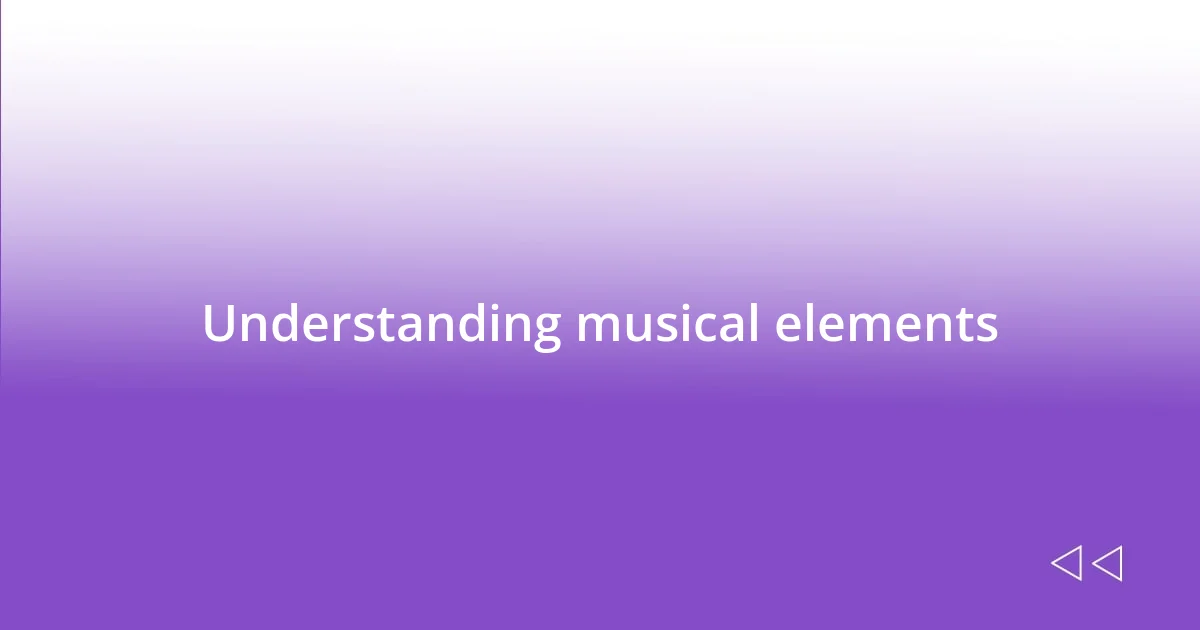
Understanding musical elements
Understanding musical elements is crucial for appreciating classical music on a deeper level. For me, elements like melody, harmony, and rhythm come together to create a vivid tapestry of sound. I often think about how a striking melody can evoke memories or emotions—just like the first time I heard Beethoven’s “Moonlight Sonata.” The way those notes rise and fall captured my heart and transported me to another place, reminding me that music speaks where words fail.
Harmony, too, plays a significant role in conveying emotion. I’ve always found it fascinating how different chords can create distinct feelings. For example, listening to a major chord can instantly feel uplifting, while a minor chord may evoke a sense of melancholy. Can you remember a time when a particular chord progression caught you off guard? I vividly recall the first time I heard the haunting harmonies of Mahler’s symphonies; they plunged me into a sea of contemplation and introspection.
Then there’s rhythm, which often shapes the way I experience a piece. I recall attending a live performance of a Tchaikovsky ballet, where the pulsating rhythms brought the dancers to life. It was mesmerizing how the tempo could accelerate my heartbeat or lull me into a serene state. It really makes me wonder, how much do you pay attention to the rhythmic patterns in the music you listen to? For me, the intricacies of rhythm are like a heartbeat, driving the emotional intensity of each performance.
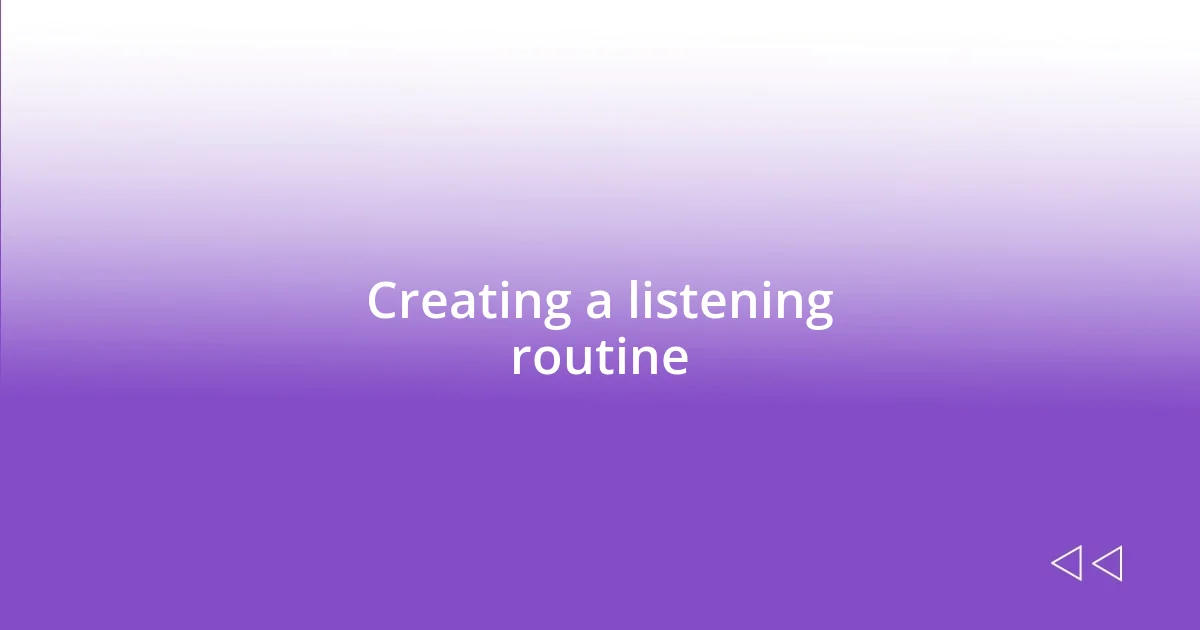
Creating a listening routine
Creating a listening routine has been transformative for my classical music experience. I find that setting aside specific times each week not only allows me to explore new pieces but also deepens my appreciation for the music. Just last Sunday, I made a ritual out of my morning coffee while listening to Bach’s Cello Suites, a combination that’s become my go-to for peaceful reflection. This small routine has elevated my mornings and provided a comforting anchor to my week.
I also suggest varying your listening environment to enhance your experience. Sometimes, I switch between the cozy ambiance of my living room and the serenity of a nearby park, where nature intermingles with the sound of a string quartet playing Haydn. Have you ever noticed how the surroundings can impact the way you perceive music? I certainly have—there’s something about the breeze that seems to make the notes soar even higher.
Finally, I like to keep a journal to document my listening journey. Writing down my thoughts and feelings about each piece often reveals connections I hadn’t noticed before, like discovering how Rachmaninoff’s melodies mirror my own highs and lows. Do you think keeping a listening journal might help you uncover deeper insights about the music you love? For me, this practice has transformed casual listening into a personal exploration of emotions and memories.
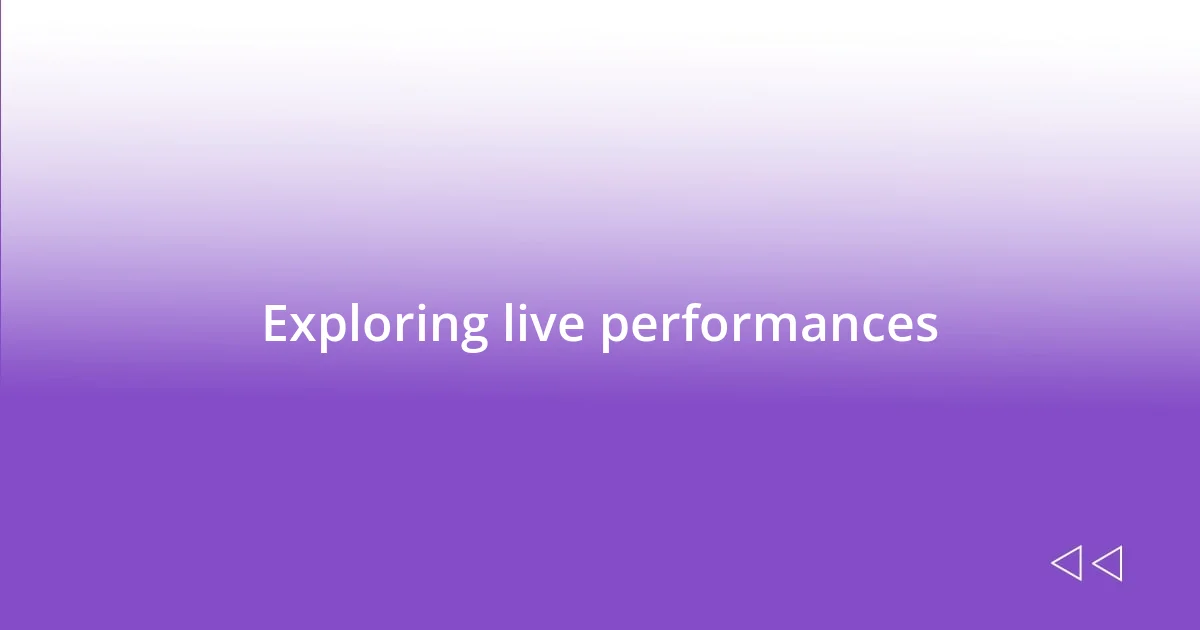
Exploring live performances
When I step into a concert hall, the buzz in the air is almost tangible. The anticipation I feel as the lights dim and the orchestra tunes up is electric. I remember one particular evening when I attended a live performance of Vivaldi’s “The Four Seasons.” The energy in the room was infectious, and as the music unfolded, I felt a connection with strangers around me—each of us swept away by the same mesmerizing melodies. Have you ever felt that shared experience at a concert? It’s a unique bond that transforms individual listening into a communal celebration of art.
There’s something truly special about experiencing music in a live setting that recordings simply can’t replicate. The nuances in the performers’ expressions and the acoustic qualities of the venue create a rich soundscape that draws me in completely. I can still vividly recall a night watching a string quartet perform in a small, candlelit church. The intimate atmosphere allowed their emotions to resonate deeply, giving me goosebumps with every bow stroke. In those moments, I often find myself wondering: how does live music affect your emotional responses compared to listening at home? For me, it’s a vivid reminder of the powerful effect that communal atmospheres can have on our artistic experience.
I also cherish the unpredictability of live performances. There’s an exhilarating thrill knowing that anything can happen on stage. I was once at a concert where the lead violinist lost their place during a particularly fast-paced piece. Instead of faltering, they improvisationally responded, leading the ensemble and the audience into an unexpected, yet beautiful, detour. It made me appreciate the musicians’ agility and artistry even more. Do you appreciate that element of surprise in a performance? It’s these unscripted moments that often create lasting memories, reminding me how alive music truly is.











